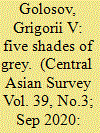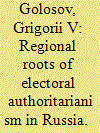| Srl | Item |
| 1 |
ID:
134999


|
|
|
|
|
| Summary/Abstract |
This study examines the limits of electoral engineering in a consolidating authoritarian regime by focusing on the case of the Imperiali highest averages method of proportional seat allocation in Russia's regional legislative elections. The Imperiali method strongly disadvantages the opposition. But, in the absence of political constraint or trends towards liberalisation, most of the regional decision makers still chose a more permissive formula. The trade-off among the incentives to solidify the power monopoly, to maintain the democratic façade of the regime and to co-opt the opposition was achieved by rejecting the least permissive electoral formula and choosing a middle-of-the-road solution instead.
|
|
|
|
|
|
|
|
|
|
|
|
|
|
|
|
| 2 |
ID:
191759


|
|
|
|
|
| Summary/Abstract |
Is coordinated anti-regime voting by opposition-minded citizens possible in authoritarian settings where the opposition does not coalesce against the regime? If so, what are the factors behind the citizens’ (un)willingness to vote strategically for the opposition? This study investigates the ‘smart vote’ (umnoe golosovanie) strategy of Aleksei Naval’nyi in the 2020 subnational elections in Russia and shows that it boosted non-regime candidates’ electoral results countrywide. The article also finds that the willingness of anti-regime voters to behave strategically depends on the candidates’ opposition credentials, and that this willingness can be affected by the scope of voter intimidation available to the authorities.
|
|
|
|
|
|
|
|
|
|
|
|
|
|
|
|
| 3 |
ID:
070181


|
|
|
| 4 |
ID:
173332


|
|
|
|
|
| Summary/Abstract |
This article overviews and seeks to explain the processes of party system formation in the post-Soviet Central Asian states (Kazakhstan, Kyrgyzstan, Tajikistan, Turkmenistan and Uzbekistan) by focusing on a crucial party-system property, fragmentation. The analysis reveals that to a much greater extent than in democracies, where party systems are largely shaped by societal factors, the level of party system fragmentation in autocracies is determined by the scope of presidential powers, as entrenched in the formal institutional order and reflected in the national constitution. The level of authoritarianism is largely inconsequential for party system fragmentation, while the role of electoral rules is secondary. Institutionally weak and institutionally strong autocratic presidents have a preference for fragmented party systems, while presidents with an intermediate range of powers seek and obtain low levels of party system fragmentation.
|
|
|
|
|
|
|
|
|
|
|
|
|
|
|
|
| 5 |
ID:
154383


|
|
|
|
|
| Summary/Abstract |
Using data from three cycles of regional elections (2003–2006; 2007–2010; 2011–2014), this article examines membership turnover in the legislative assemblies of Russia’s federal units. The analysis demonstrates that the mode of executive–legislative relations is highly consequential for legislative turnover. The change of chief regional political executive usually led to increased rates of change in legislative personnel. This influence is conditioned by the effective political capacity of the incumbent governor. Other factors of persistent importance for legislative turnover in Russia’s regions include change in the party composition of the assembly and generational change.
|
|
|
|
|
|
|
|
|
|
|
|
|
|
|
|
| 6 |
ID:
105271


|
|
|
| 7 |
ID:
104183


|
|
|
|
|
| Publication |
2011.
|
| Summary/Abstract |
THE TRANSFORMATION OF RUSSIA'S POLITICAL LIFE IN 2003-2007 was profound,
and it did not remain unnoticed by international democracy observers. Freedom
House downgraded Russia's status from 'partly free' in 2003 to 'not free' in 2007; the
Polity IV DEMOC score for Russia decreased from six in 2003 to five in 2007, which
corresponds with crossing a major dividing line between an imperfect democracy and
outright authoritarianism.1 From such scores, one might conclude, what we have
observed is a period of regime change. Indeed, several scholars and analysts have
invested their efforts into the study of a set of incentives and strategies that led
Russia's leadership to an abrupt authoritarian turn (Gill 2006; Hassner 2008; McFaul
& Stoner-Weiss 2008). What is often missing in such analyses, however, is the process
of transformation. Perhaps because they have concentrated on the national level of
politics, the students of regime change in Russia seem to have missed empirical
indicators that could have allowed them to trace the phases of transformation. As a
result, the picture becomes blurred: we have the relatively free 2003 Duma elections,
the obviously not-free 2007 Duma elections, and a black box in between.
|
|
|
|
|
|
|
|
|
|
|
|
|
|
|
|